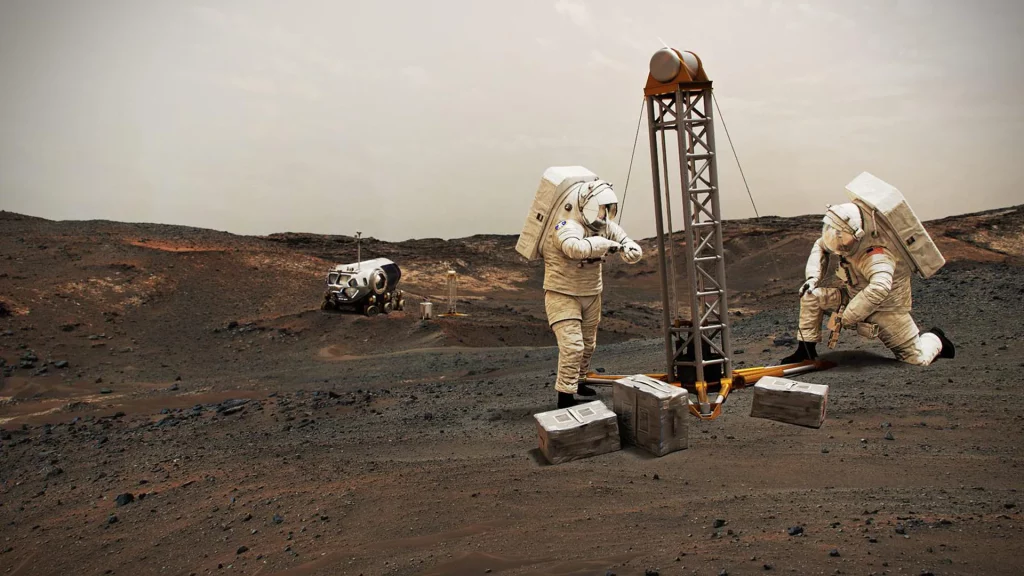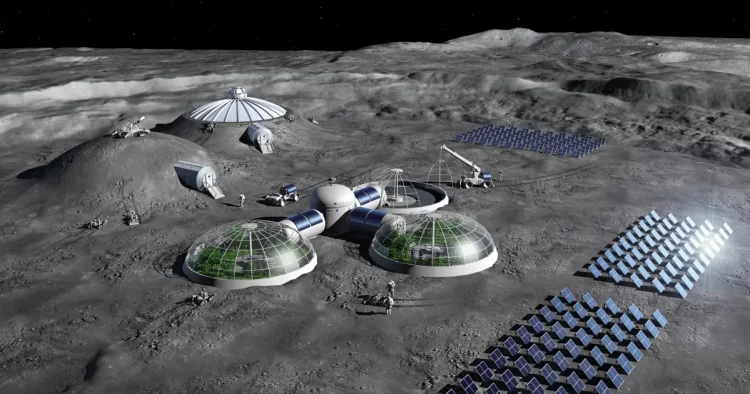Introduction: Why Building a Permanent Base on the Moon Is Key to Space Exploration
Humanity’s ambitions in space have always reached for the stars, but in recent years, the Moon has become the focus of a more immediate and practical goal: establishing a permanent base. After decades of robotic exploration and the success of the Apollo missions, the next logical step in space exploration is creating a sustainable presence on the Moon. This base would serve as a springboard for future missions to Mars and beyond, providing not only a testing ground for life in space but also invaluable resources and technological advancements that could benefit Earth.
The Moon’s proximity to Earth and its relatively stable surface make it an ideal candidate for the first permanent human outpost in space. Unlike the vast distances to other planets, the Moon is just 384,400 kilometers away, meaning it is within reach for regular missions. Establishing a base there is not only about advancing space exploration but also about ensuring the survival of humanity as a multi-planetary species.
This article explores the strategic importance of lunar bases, from utilizing the Moon’s resources to international collaborations and the technological innovations needed to make it all possible. It also highlights the challenges, ethical questions, and long-term goals that will shape humanity’s lunar future.
Lunar Resources and In-Situ Utilization: How the Moon Could Supply Materials for Further Exploration
One of the most compelling reasons to establish a permanent base on the Moon is the potential to tap into its vast resources. While Earth’s resources are finite and costly to extract, the Moon holds materials that could be used for future space exploration and, in some cases, provide the foundation for a sustainable presence beyond Earth.
- Helium-3: The Moon is believed to contain significant amounts of Helium-3, a rare isotope that is considered a potential fuel for future fusion reactors. Fusion energy is seen as the “holy grail” of clean energy, and harvesting Helium-3 from the Moon could provide a sustainable power source for future generations on Earth and space missions.
- Water Ice: Recent discoveries have confirmed that water ice exists in permanently shadowed craters at the Moon’s poles. Water is essential for human life, and it can also be split into hydrogen and oxygen to create rocket fuel. The Moon could become a fueling station for missions deeper into space, such as Mars, by providing the necessary resources to produce fuel directly on the lunar surface.
- Regolith: The Moon’s surface is covered in a fine dust called regolith, which contains important minerals such as silicon, iron, and titanium. These materials could be used for construction purposes, reducing the need to transport materials from Earth. With the right technologies, regolith could be used to build habitats, roads, and other infrastructure essential for a sustainable lunar base.
In-situ resource utilization (ISRU) is the key to reducing the cost and logistical complexity of lunar missions. Instead of relying solely on resources transported from Earth, ISRU would allow future lunar explorers to use the Moon’s natural resources to fuel their mission, making the Moon a stepping stone for more ambitious space endeavors.

International Collaboration on Lunar Bases: Partnerships Between NASA, ESA, and Private Entities
Building a permanent lunar base will require more than just one nation or company; it will require global cooperation. Just as the International Space Station (ISS) has been a successful example of international collaboration in low Earth orbit, the lunar base will likely become a symbol of peaceful cooperation among nations and a stepping stone for joint efforts to explore deeper into space.
- NASA’s Artemis Program: The Artemis program, led by NASA, is the United States’ flagship lunar exploration initiative. The goal of Artemis is to return humans to the Moon by the mid-2020s, with a long-term vision of creating a sustainable presence. As part of this program, NASA plans to build the Lunar Gateway, a space station that will orbit the Moon and act as a staging point for surface missions. Artemis aims to establish the first woman and the next man on the lunar surface, with a focus on the lunar South Pole, where water ice is abundant.
- European Space Agency (ESA): The ESA has been a key player in global space exploration efforts and is involved in lunar exploration, especially in the development of robotic missions and the Lunar Gateway. ESA’s Moon Village concept envisions an international lunar base that would be a collaborative effort, with various nations contributing to infrastructure, technology, and research. ESA has also developed several technologies for landing on and exploring the Moon’s surface.
- Private Sector Involvement: The private sector is becoming increasingly important in space exploration, and companies like SpaceX, Blue Origin, and Lockheed Martin are leading the way in lunar exploration. SpaceX’s Starship, designed for deep space travel, could play a critical role in transporting people and cargo to the Moon. Blue Origin, with its Blue Moon lander, has proposed providing lunar transportation and cargo delivery services. These companies are making significant investments in lunar infrastructure, and their collaboration with government agencies will be essential for achieving a sustainable lunar base.
The Moon will likely become a hub of international cooperation, with countries around the world contributing expertise, funding, and technologies to establish a permanent human presence. Collaborative efforts will ensure that the challenges of lunar exploration and settlement are met with a united global front.
Technological Advancements for Moon Habitats: Innovations Required to Sustain Human Life on the Moon
Building a permanent base on the Moon is a monumental challenge that will require breakthroughs in numerous technological fields. From life support systems to habitat construction, these innovations will ensure that humans can survive and thrive on the Moon, even in the harsh conditions of space.
- Life Support Systems: The Moon’s environment is hostile to human life. There is no breathable atmosphere, extreme temperature fluctuations, and high radiation levels. To address these challenges, new life support technologies are being developed, including closed-loop oxygen systems and radiation shielding for habitats. NASA’s Environmental Control and Life Support System (ECLSS) is an example of technology designed to recycle air and water, providing astronauts with a sustainable life support system for extended stays in space.
- Lunar Habitat Construction: The construction of habitats on the Moon will require innovative materials and techniques. One promising solution is the use of 3D printing with lunar regolith. This technology could allow astronauts to print building materials directly on the Moon, reducing the need to transport materials from Earth. Inflatable habitats, which can be compacted during transport and then inflated on the lunar surface, could also provide astronauts with flexible and scalable living spaces.
- Robotics and Automation: To reduce the risks to human life, robotics will play a vital role in building and maintaining lunar bases. Autonomous robots could be used to prepare the landing site, set up infrastructure, and perform tasks that would otherwise be too dangerous for humans. Teleoperated rovers and drones could be used to scout the lunar surface, conduct research, and assist with construction efforts.
- Energy Solutions: Providing power for a lunar base will be a major challenge. The Moon’s lack of atmosphere means that solar energy is the most viable power source, but the long lunar nights (lasting around 14 Earth days) require energy storage solutions. Technologies like nuclear reactors or lunar-based solar farms are being explored to ensure a continuous energy supply.
Challenges and Ethical Considerations: The Impact of a Lunar Base on the Environment and Future Generations
While the potential benefits of a lunar base are immense, the endeavor raises several ethical and environmental questions that must be carefully considered.
- Environmental Impact: Human activity on the Moon could alter its pristine environment. Concerns about contamination, such as the spread of Earth-based microbes, must be addressed to avoid polluting the Moon or interfering with its natural state. International agreements, like the Outer Space Treaty, will play a crucial role in ensuring that lunar exploration is conducted responsibly.
- Future Generations: The construction of a lunar base will set precedents for future generations. It is essential to consider how the resources of the Moon are used, who will have access to them, and how the legacy of lunar exploration will be managed. Ethical considerations regarding the commercialization of space, the rights to resources, and the long-term sustainability of lunar settlements are critical to ensuring that humanity’s expansion into space is equitable and responsible.
Conclusion: The Role of the Moon in Humanity’s Long-Term Space Goals
A permanent base on the Moon is not just a stepping stone for lunar exploration; it is a foundational part of humanity’s long-term goals in space. By developing the technologies to survive and thrive on the Moon, we can pave the way for future missions to Mars, asteroids, and beyond. The Moon’s resources, proximity, and potential for collaboration make it an ideal location for humanity’s first steps in building a multi-planetary civilization.
In the coming decades, we will witness unprecedented cooperation between nations and private companies as we work toward a sustainable human presence on the Moon. The challenges are immense, but the rewards for future generations of explorers, scientists, and citizens of Earth are equally great.











































Discussion about this post